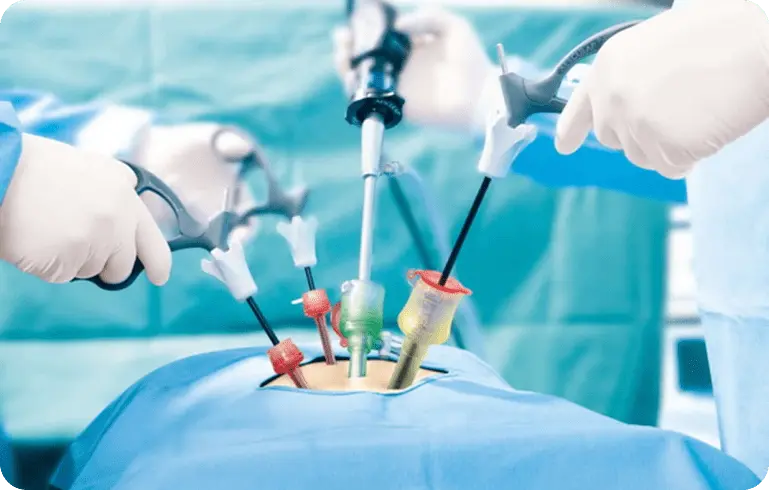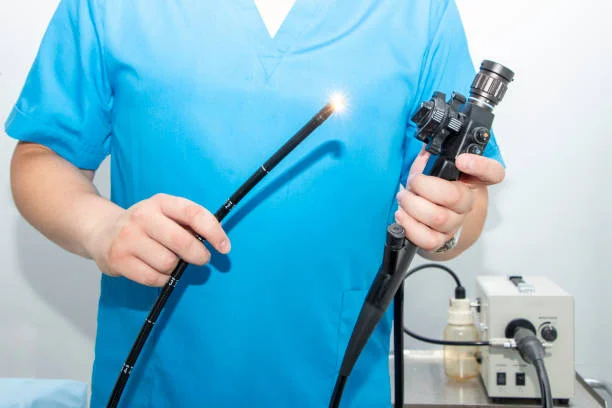Is there a simple test to catch cancer early, remove risky polyps, and identify issues before symptoms appear?
Colonoscopy in Navi Mumbai
- Dr Nitish Jhawar, with 23 years of experience

Book An Appointment
What is a Colonoscopy?
A colonoscopy is a medical procedure that allows doctors to examine the inner lining of the colon and rectum using a flexible tube with a tiny camera at the end. This device, known as a colonoscope, provides a clear view of the colon, helping identify abnormalities or issues such as polyps, inflammation, or early signs of colorectal cancer.
During the procedure, your doctor can remove small polyps or take tissue samples for further analysis, making it both diagnostic and therapeutic.
However, if you have rectal bleeding or lower abdominal pain, only then a less invasive procedure like Flexible sigmoidoscopy is used.
What is Flexible Sigmoidoscopy?
Flexible sigmoidoscopy is an endoscopic procedure to view the inside of the sigmoid colon and rectum (the lower part of the large bowel). It can detect inflamed tissue, ulcers, abnormal growths, or signs of cancer.
Why is Colonoscopy Important?
- Early Detection: Helps catch colorectal cancer at an early, more treatable stage.
- Polyp Removal: Allows removal of potentially precancerous polyps before they develop into cancer.
- Essential for At-Risk Individuals: Especially recommended for those over 50 or with risk factors such as:
- Family history of colorectal cancer.
- Personal history of polyps or inflammatory bowel disease.
- Preventive Health Measure: Reduces the risk of developing colorectal cancer and supports long-term digestive health.
For those in the Navi Mumbai area, colonoscopy in Navi Mumbai is readily accessible with skilled specialists like Dr. Nitish Jhawar, who provides thorough and compassionate care.
Proactive screenings like these safeguard your health and can offer peace of mind, ensuring your digestive system stays in optimal condition.
When to Consider a Colonoscopy?
A colonoscopy is often recommended when certain symptoms or conditions raise concerns about colon health. If you’re experiencing any of the following symptoms, it might be time to consider scheduling a colonoscopy in Navi Mumbai with a trusted specialist:
- Unexplained Abdominal Symptoms: Persistent or unexplained abdominal pain can indicate underlying colon conditions that a colonoscopy can help diagnose.
- Recent Changes in Bowel Habits: Changes in bowel movements, such as frequency, consistency, or colour, may suggest digestive issues that need further investigation.
- Persistent Diarrhea: Long-term diarrhoea could be a sign of inflammatory bowel conditions or other gastrointestinal disorders that require a closer look.
- Iron Deficiency Anemia: Low iron levels, especially without a clear cause, can signal internal bleeding in the gastrointestinal tract.
- Bleeding from the Rectum or Positive Stool Blood Test: Any bleeding from the rectum or a positive faecal occult blood test can indicate the presence of polyps, haemorrhoids, or other issues that need attention.
- Inflammatory Bowel Disease (Colitis): Conditions like Crohn’s disease and ulcerative colitis often require monitoring with colonoscopy to assess inflammation and manage treatment.
- Polyp or Tumor Findings in Barium Enema Exam: A colonoscopy is essential for confirmation and potential biopsy if an earlier imaging test (such as a barium enema) suggests polyps or tumours.
How Can Preventative Screening for Colorectal Health Prevent Colon Cancers?
Routine colonoscopy screenings are essential, particularly for individuals over 50 or those with higher risk factors.
Those who have a history of colon or rectal cancer in family members may have their colonoscopy at age 40.
For residents in Navi Mumbai looking for colonoscopy screenings, working with an experienced specialist like Dr. Nitish Jhawar ensures thorough care with attention to early detection and preventive treatment.
How does Dr. Nitish Jhawar Approach Colonoscopy in Navi Mumbai?
Dr. Nitish Jhawar is a highly regarded laparoscopic and colorectal surgeon with extensive expertise in performing colonoscopies. His approach is centered on patient comfort, precision, and quality care, ensuring each patient feels well-informed and at ease throughout the process.
Dr. Jhawar’s deep understanding of gastrointestinal health and years of experience allow him to perform accurate and effective colonoscopies, delivering top-tier care to his patients.
Minimally Invasive Technique & Precision
Dr. Jhawar emphasizes using minimally invasive techniques designed to maximize patient comfort and minimize recovery time. His precise approach to colonoscopy enables early detection of colon conditions, allowing patients to address issues before they escalate. This commitment to accuracy makes the procedure efficient and stress-free, with minimal discomfort for the patient.
Cutting-Edge Technology
Dr. Jhawar utilizes advanced, state-of-the-art technology to perform colonoscopies with the highest standards of care. With modern colonoscopes and imaging technology, he achieves enhanced visualization of the colon, ensuring thorough examination and prompt detection of polyps, inflammation, or early signs of colorectal cancer.
This blend of expertise and cutting-edge equipment ensures Dr. Jhawar’s patients receive the most reliable and effective care available in Navi Mumbai.
How do you prepare for your colonoscopy at Dr. Nitish Jhawar’s clinic in Navi Mumbai?
Preparing for a colonoscopy can feel overwhelming, but the process is simpler and more comfortable with the right guidance. Dr. Nitish Jhawar and his team are dedicated to ensuring every patient understands what to expect and feels supported from start to finish.
Here’s a quick guide to help you confidently prepare and approach your colonoscopy.
Pre-Procedure Instructions
A few preparatory steps are necessary to ensure the colonoscopy provides a clear view of your colon. Typically, this includes: The large intestine should be clear of faeces for adequate visualization. Medication and a low fiber diet for 3 days prior is advised:
- Foods To take:
- Simple carbohydrates (white rice, white bread, potatoes)
- Fish
- Foods to Avoid:
- Fruits and vegetables, including fresh fruit and vegetable juices
- Vegetable soup
- Red meat
- Milk products
- Cereals and grains e.g. oats, bran, wheat, muesli, barley nuts and beans.
These steps are all about helping Dr. Jhawar get the best possible results. His team will be with you every step, answering questions and providing support.
What to Expect During the Colonoscopy Procedure?
A colonoscopy is usually done by a proctologist, colorectal surgeon or gastroenterologist.
- Preparation and Anaesthesia: You’ll be comfortable in a private setting, and a gentle sedative will help you relax.
- Procedure: Dr. Jhawar will guide a thin, flexible tube with a small camera (colonoscope) through the anus, allowing for a thorough, painless examination.

- Completion: The procedure typically takes 30-60 minutes, and you’ll be monitored as the sedation wears off. Most patients can head home shortly afterwards, feeling reassured and relieved.
At Dr. Jhawar’s clinic, your comfort and peace of mind come first; every effort is made to ensure you feel prepared, safe, and cared for throughout the process.
How’s the Recovery After a Colonoscopy Procedure?
Recovery Guidelines
Following a colonoscopy, you’ll be given time to rest and let the sedative fully wear off. Most patients feel well enough to go home shortly afterwards but should plan for a light, gentle day:
- Eating and Drinking: Start with light meals and drink plenty of fluids to help rehydrate. A mild diet with easy-to-digest foods is often best for the rest of the day.
- Rest and Activity: You might feel a bit groggy, so it's recommended that you take it easy and rest at home. Avoid strenuous activity for at least 24 hours.
Follow-Up Care
Dr. Jhawar emphasizes that follow-up care is just as important as the procedure itself:
- Symptoms to Watch For: Mild bloating or gas is normal, but contact the clinic if you experience significant pain, prolonged bleeding, or fever.
- Scheduling a Follow-Up: If biopsies were taken or polyps removed, Dr. Jhawar will schedule a follow-up to review results and discuss any necessary next steps. Routine screenings may be recommended every few years, depending on your results and risk factors.
With Dr. Jhawar’s guidance, your recovery will be smooth, and you will be helped to stay proactive in managing your colon health.
Frequently Asked Questions (FAQs)
Preparing for a colonoscopy often comes with a few questions, and Dr. Nitish Jhawar and his team are here to make sure you feel comfortable and informed. Here are answers to some of the most common questions patients ask.
A colonoscopy generally takes about 30 to 60 minutes. You’ll also need time to check in, prepare, and allow the sedation to wear off afterwards, so plan for about 2 to 3 hours at the clinic in total.
Most patients feel no pain during the procedure, thanks to a gentle sedative that keeps them relaxed and comfortable. Afterwards, you may experience some mild bloating or gas, but this usually passes within a few hours.
For individuals at average risk, it’s recommended to have a colonoscopy every 10 years starting at age 50. However, if you have risk factors like a family history of colorectal cancer or previous polyps, Dr. Jhawar may suggest more frequent screenings.
A colonoscopy is a very safe and routine procedure. Complications are rare, and Dr. Jhawar’s use of advanced technology and minimally invasive techniques further ensures a smooth and secure experience. The risks are minimal compared to the potential benefits of early detection and prevention.
These FAQs cover the basics, but Dr. Jhawar’s team is always available to answer any additional questions you might have.
